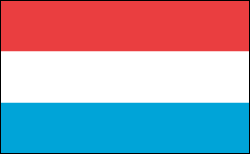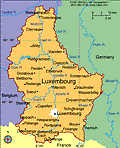Luxembourg | Facts & Information

- Luxembourg Profile
- History
Facts & Figures
-
Ruler: Grand Duke Henri (2000)
Prime Minister: Xavier Bettel (2013)
Total area: 998 sq mi (2,585 sq km)
Population (2014 est.): 520,672 (growth rate: 1.12%); birth rate: 11.75/1000; infant mortality rate: 4.28/1000; life expectancy: 80.01
Capital and largest city (2011 est.): Luxembourg, 94,000
Monetary unit: Euro (formerly Luxembourg franc)
National name: Grand-Duché de Luxembourg
Languages: Luxermbourgish (national) French, German (both administrative)
Ethnicity/race: Luxembourger 63.1%, Portuguese 13.3%, French 4.5%, Italian 4.3%, German 2.3%, other EU 7.3%, other 5.2% (2000 census)
Religions: Roman Catholic 87%; Protestant, Jewish, Islamic 13% (2000)
National Holiday: National Day, June 23
Literacy rate: 100% (2003 est.)
Economic summary: GDP/PPP (2013 est.): $42.67 billion; per capita $77,900. Real growth rate: 0.5%. Inflation: 1.8%. Unemployment: 4.9%. Arable land: 23.9%. Agriculture: wine, grapes, barley, oats, potatoes, wheat, fruits; dairy products, livestock products. Labor force: 208,800 note: data exclude foreign workers; in addition to the figure for domestic labor force, about 150,000 workers commute daily from France, Belgium, and Germany (2013 est.) Industries: banking and financial services, iron and steel, information technology, telecommunications, cargo transportation, food processing, chemicals, metal products, engineering, tires, glass, aluminum, tourism. Natural resources: iron ore (no longer exploited), arable land. Exports: $15.8 billion (2013 est.): machinery and equipment, steel products, chemicals, rubber products, glass. Imports: $23.12 billion (2013 est.): minerals, metals, foodstuffs, quality consumer goods. Major trading partners: Germany, France, Belgium, UK, Italy, Netherlands, China, U.S., Switzerland (2013).
Communications: Telephones: main lines in use: 266,700 (2012); mobile cellular: 761,300 (2012). Broadcast media: Luxembourg has a long tradition of operating radio and TV services to pan-European audiences and is home to Europe's largest privately-owned broadcast media group, the RTL group, which operates 46 TV stations and 29 radio stations in Europe; also home to Europe's largest satellite operator, Societe Europeenne des Satellites (SES); domestically, the RTL group operates TV and radio networks; other domestic private radio and TV operators and French and German stations available; satellite and cable TV services available (2008). Internet Service Providers (ISPs): 250,900 (2012). Internet users: 424,500 (2009).
Transportation: Railways: total: 275 km (2008). Roadways: total: 2,899 km; paved: 2,899 km (including 152 km of expressways) (2008). Waterways: 37 km; Moselle. Ports and terminals: Mertert. Airports: 2 (2013).
International disputes: none.









